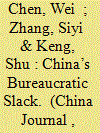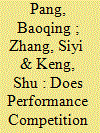|
|
|
Sort Order |
|
|
|
Items / Page
|
|
|
|
|
|
|
| Srl | Item |
| 1 |
ID:
190383


|
|
|
|
|
| Summary/Abstract |
In recent years, Party leaders have expressed concern about “bureaucratic slack,” or shirking, by local government officials. This article investigates the reasons for the emergence of bureaucratic slack in China’s political system. It verifies two popular hypotheses, namely, reduced material inducements and increased risk. Using a unique national survey of 1,789 local cadres, we confirm both hypotheses. Our survey also reveals differences across groups of local cadres. We find bureaucratic slack among lower-ranked cadres to be caused mainly by the lack of material inducements, while higher-ranked officials are more discouraged by increased risks. We conducted follow-up fieldwork to examine in greater depth why each cohort responded differently to the Xi administration’s administrative reforms and anticorruption drives.
|
|
|
|
|
|
|
|
|
|
|
|
|
|
|
|
| 2 |
ID:
192629


|
|
|
|
|
| Summary/Abstract |
How can China develop so quickly and yet maintain stability? Most scholars pinpoint the efforts of China's local government leaders as a primary factor. Regarding what motivates these leaders, however, scholars display wide disagreement. The widely accepted “promotion tournament” hypothesis stresses competition among local leaders as the driving force, but empirical test results vary considerably and create controversy. We argue that tests of promotion competition should target leadership behaviour rather than institutional inducements; the latter are, at best, a necessary condition of the former. Informed by extensive fieldwork, this study proposes an alternative and more direct approach to verifying the promotion tournament hypothesis by examining the impacts of promotion competition on leaders’ performance efforts. Our test results show, however, that competition for promotion has no significant impact on local leaders’ behaviour, thereby indicating that the promotion tournament hypothesis cannot be the primary explanation for China's economic achievements and regime resilience. In so doing, our study illuminates the oversimplified assumptions behind a prevailing proposition in Chinese politics and offers empirically informed insights into the tensions between political institutions and leadership behaviour.
|
|
|
|
|
|
|
|
|
|
|
|
|
|
|
|
|
|
|
|
|